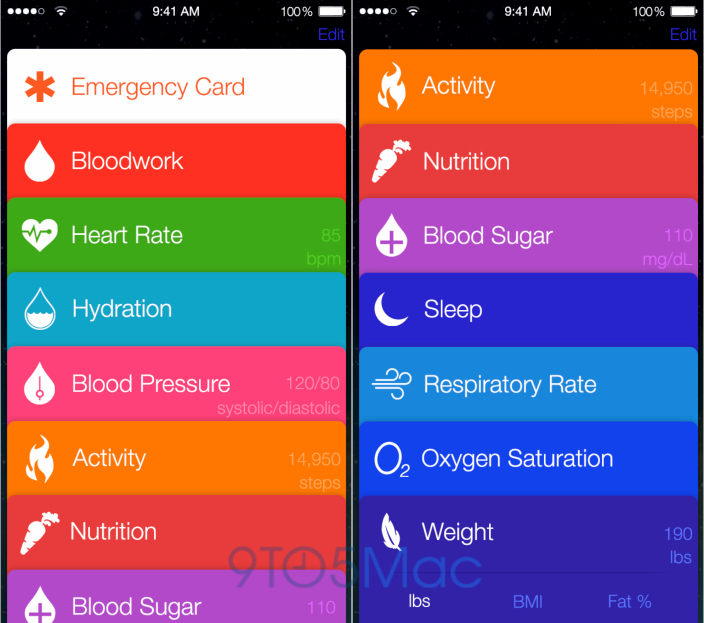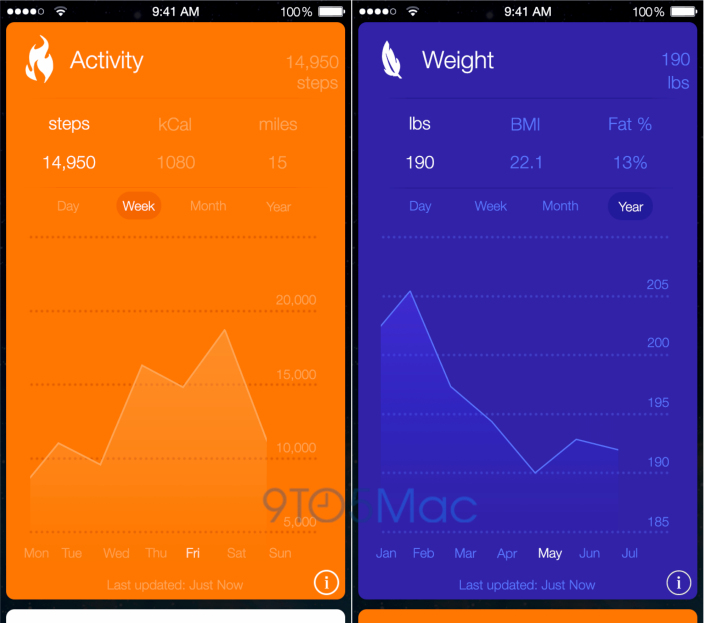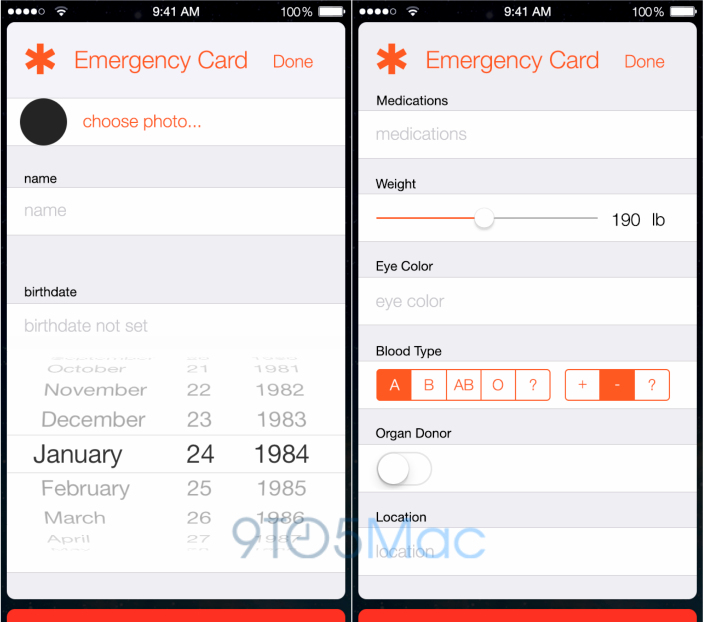Back in January, the usually reliable blogger Mark Gurman first shared details of a new Healthbook application said to debut in iOS 8 later this year.
Since then, we’ve seen a cool Healthbook app icon mockup and now Gurman has shared a plethora of details about the software.
As it turns out, Healthbook will be Apple’s foray into health and fitness tracking as the app is said to source activity data from a variety of sources.
Think the M7 motion coprocessor, Apple’s rumored wearable device as well as third-party applications and accessories. Reminiscent of the iOS Passbook app, Healthbook should be a singular place for all the accompanying health and fitness related data to be stored and viewed.
Jump past the fold for the full reveal and a bunch of screenshot mockups…
Gurman claims to have been shown a series of Healthbook images by “multiple sources working directly on the initiative’s development”. The images seen throughout this article are “complete recreations” of the original screenshots.
Healthbook is said to be capable of tracking several different health and fitness data points, including fitness related data such as Activity, Weight and Nutrition, heart rates and blood pressure, bloodwork, oxygen saturation and blood sugar levels, sleep patterns, hydration and respiratory rates and more.
Here are the details:
Heart rate and blood pressure – As depicted on the above screenshot mockup, heart rate tracking will record your beats per minute (BPM) while blood pressure monitoring will of course record both diastolic (minimum) and systolic (peak) forms.
Hydration and respiratory rate measuring – If you work out a lot and are concerned about hydrating, hydration tracking will let you know how much water is in your body. Respiratory rates, as measured by breaths per minute, are equally important for the active types and Gurman observes that there are “not many known wearable devices that specialize in tracking respiratory rates currently”.
Sleep tracking – My sleeping habits are terrible so I’m going to be using this feature a lot. Apparently, Healthbook will have the ability to track sleep cycles akin to specialized accessories like the FitBit and Jawbone trackers , though the report stops short of giving us the specifics.
Bloodwork, oxygen saturation and blood sugar – Blood tracking functionality is apparently found in sections aptly named Bloodwork, Oxygen Saturation and Blood Sugar. The Bloodwork section should contain “several different blood-related data points normally provided by healthcare professionals,” though details are vague at this stage.
Same goes for tracking your oxygen saturation – that is, the percentage of oxygen that’s in your blood, an important metric for measuring respiratory rates. Surprisingly, though, Healthbook is said to store blood sugar (glucose) levels, which contradicts a report by MobiHealthNews claiming that the iWatch won’t have advanced health sensors for glucose sensing and hydration tracking as initially thought.
Another supposed feature of Healthbook: Emergency Card, seen below.
It’s basically a centralized repository for your critical data like name, birthdate, medication information, weight, eye color, blood type, organ donor status and location. This could be used by healthcare specialists to quickly assess your key health related stats should you get injured and become unable to speak.
The Emergency Card feature will also allow users to add emergency contact information. With that feature, someone would be able to instantly called a pre-programmed phone number to a user’s family member, for example, to notify them of an emergency.
In order to be truly useful, it seems plausible that this emergency information would be accessible from the iPhone’s Lock screen much like Passbook passes could appear on the Lock screen.
Gurman acknowledges that he has no idea where Healthbook will source the various types of health and fitness data from. He goes on to postulate that the data could be provided by the iPhone itself (with a little help from its M7 motion tracking chip: steps taken, miles walked, calories burned, etc.), third-party App Store apps, specialized third-party devices (blood, hydration and respiratory rates) or a rumored iWatch device.
Mockup of sleep tracking in iOS 8’s Healthbook.
“Just like the similarly named Passbook is a central place for iPhone users to access movie tickets, coupons, and boarding passes from other apps, Healthbook could be a single place where iPhone users can collect data from their various health apps,” speculates the author.
It is important to remember that all of the aforementioned capabilities could stem from Apple’s recent hires. For example, the iPhone maker hired Dr. Michael O’Reilly last year, who specializes in technologies that measure oxygen saturation.
Apple also hired former Philips engineer Roy Raymann, one of the top experts in sleep tracking who specializes in sleep patterns, sleep quality and alertness.
As for iOS 8 itself, don’t expect a lot of changes in the visual department as the software is said to refine iOS 7’s flat appearance. Previous rumors pointed to an improved Apple Maps service with built-in public transit directions, a possible standalone iTunes Radio app, all-new TextEdit and Preview native apps with tight iCloud integration, much better inter-app sharing with improvements to Messages, Notification Center, CarPlay and more.
Does any of this make any sense to you?
And are you looking forward to Healthbook in iOS 8?


